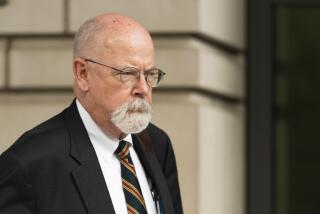A ‘Far Better’ FBI Crime Lab Is Predicted
- Share via
WASHINGTON — The chief government investigator of the beleaguered FBI crime laboratory sought to assure Congress Tuesday that the facility is “a good lab” that ultimately “will be made far better.”
Despite his critical findings a month ago, Michael R. Bromwich, the Justice Department’s inspector general, told a House subcommittee that numerous reforms he suggested should “help the FBI laboratory move into the next century as an outstanding and world-leading forensic laboratory.”
Bromwich rejected suggestions by a defense lawyers’ group that the poor management and shoddy lab practices that he documented have placed thousands of criminal cases in jeopardy.
“Certainly there will be a huge number of cases that will be challenged as defense lawyers make routine motions to try to show their clients were improperly convicted,” he said. “But that’s a far cry from saying these cases will be overturned.”
FBI and Justice Department officials have said that a special task force of prosecutors has been studying potential problems of evidence in about 50 ongoing or recently concluded cases. While the task force is informing some U.S. attorneys to adjust their presentations to juries and to notify defense lawyers of such matters, none of these cases seems to have been compromised, officials have said.
Bromwich’s testimony before the crime subcommittee of the House Judiciary Committee contrasted sharply with that of Frederic Whitehurst, the FBI lab chemist whose charges prompted Bromwich’s investigation.
Whitehurst told panel members that the FBI has retaliated against him for his disclosures and said “it remains my concern” that some defendants may have been convicted because of “false testimony” by FBI laboratory scientists about crucial evidence.
Dan Alcorn, an attorney representing the National Assn. of Criminal Defense Lawyers, said that thousands of convictions could be reversed. The association is pursuing a lawsuit to force the Justice Department to release all interviews and supporting documents obtained in Bromwich’s investigation, he said.
Subcommittee Chairman Bill McCollum (R-Fla.) expressed concern that “the accuracy of those [lab] investigations can determine the guilt or innocence” of criminal defendants.
Bromwich replied that his extensive inquiry found cases where lab scientists “exceeded their expertise” when testifying for the government in criminal trials. He insisted, however, that Whitehurst’s allegations of “perjury and fabrications of evidence” by some of his colleagues were greatly exaggerated.
“It’s one thing [for Whitehurst] to bring factual matters to the attention of authorities but the labels he attached to things and the individuals he accused of criminal conduct--we did not find that,” Bromwich said.
Asked by Rep. Bob Barr (R-Ga.), a former U.S. attorney in Atlanta, if lab scientists had been pressured to embellish their test results on the witness stand, Bromwich said that “there may have been cultural pressures” within the FBI to support federal and state prosecutors. But “we did not find any overt or even subtle pressure by a lab supervisor or a prosecutor,” he said.
Bromwich said that FBI officials have agreed to implement a number of reforms in coming months. They include seeking accreditation by the American Society of Crime Laboratory Directors, restructuring some laboratory units, improving procedures for reporting the results of scientific analyses, monitoring more closely the testimony of examiners and developing a coordinated training program for lab scientists.
Several lab employees have been reassigned or suspended with pay pending further review of their conduct, he noted.
More to Read
Sign up for Essential California
The most important California stories and recommendations in your inbox every morning.
You may occasionally receive promotional content from the Los Angeles Times.










